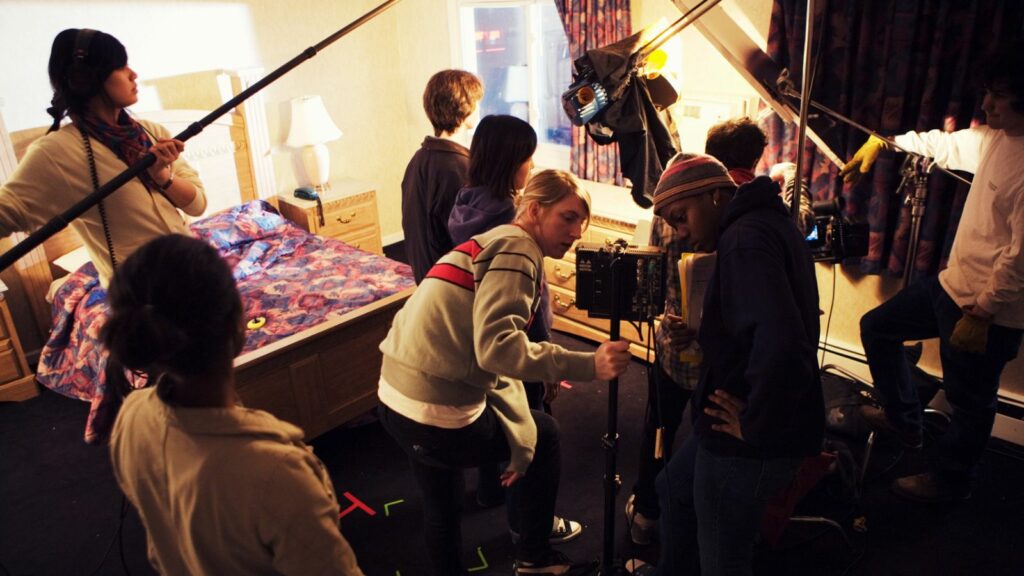Diving into the world of film isn’t just about directing blockbusters or walking the red carpet. It’s also about understanding the rich tapestry of cinema’s past. Jobs in film history offer a unique opportunity to immerse oneself in the world of classic cinema, studying the evolution of film over time.
Film History Jobs
The film history jobs has seen dramatic changes, shaped by innovative technological advancements and evolving cinematic trends. Here’s how the journey from silent cinema to the digital era has reshaped these careers.
From Silent Cinema to Digital Era

Initially, silent films dominated the industry, creating roles for film historians oriented towards the mute visual literacy. With the advent of talkies in the late 1920s, historians witnessed a seismic transition in cinema, adjusting their professional skills to encapsulate the dynamism presented by these audio-visual creations. Moving on, film restoration experts, trained in preserving physical films reels, started focusing on the advent of color films in the mid-1930s.
As time progressed, the transition of cinema from black and white to color necessitated a fresh approach to film preservation and restoration. Restoration specialists started mastering new techniques to rejuvenate color films, ensuring that vibrancy and saturation didn’t become casualties in the preservation process.
However, the biggest transformation indeed came with the digital revolution when film started transcending from celluloid to digital screens. Here, in today’s age of predominant digital cinema, archivists and restorers grapple with challenges to preserve digitally rendered films, wrestling with the ephemeral nature of digital data.
Influence of Technology on Film History Careers
Technology, particularly in the digital era, has imparted a profound influence on film history jobs. As films transitioned from celluloid to digital, a pressing need arose for film historians to understand this evolving technology. With digitization came the role of digital archivists, responsible for preserving digital assets. These professionals require proficiency in digital asset management systems, ensuring the durability of digital film materials.

Moreover, the surge in online platforms revolutionized film distribution, inadvertently affecting careers associated with film history. Streaming platforms now offer access to a vast library of classic and modern films, enabling film historians and lecturers to expose their students to a wider range of cinematic content. Consequently, educators geared towards film history have adapted, leveraging these platforms to their advantage and adjusting their teaching style to accommodate this access.
The Job Market for Film History Experts
Top Hiring Sectors
Academic institutions remain at the forefront of employing film history experts. As professors, researchers, or librarians, these individuals impart knowledge, aid scholarly work, and manage collections.
Film production companies form another significant sector. Film historians here generally work as consultants, ensuring accurate and reliable reproductions of past eras. They aid in set design, costumes, script, and character development, preservation of context, thus bringing authenticity to every shot.

Museums, historical societies, and archives hold substantial opportunities for archivists who are film history experts. They preserve, restore, and catalog historic film materials, some dating back to the era of silent cinema and some offering glimpses into the burgeoning digital era.
Lastly, film databases and streaming platforms also recruit these specialists. Be it for research, curation, or the restoration of digitized films, film history experts play key roles.
Salary Expectations and Career Prospects
Salaries in Film History can vary widely based on the sector, geographical location, level of expertise, and years of experience. On average, a film historian employed in academia could be looking at an annual salary package ranging from $56,000 to $102,000. In contrast, professionals dealing with set design and film production could earn anywhere between $47,000 and $92,000 a year.
Career prospects for these experts extend well beyond traditional roles. As the film history field evolves with technology advancements, new opportunities continue to arise.
Unique Careers
The realm of film history jobs is vast and full of opportunities for cinema aficionados. The role of film historians is crucial in understanding the evolution of cinema, with unique careers like film archivists and restoration specialists playing a significant part. Technological advancements have reshaped the job landscape, leading to roles such as digital archivists and digitally skilled restoration experts.


